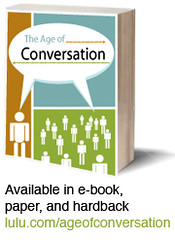Filed under: The Rules
 Part 2
Part 2
- it’s perfectly OK to interrupt another meeting in progress with a ‘quick question’
- turn up late to meetings and leave before they’ve finished
- keep your mobile on, read your emails on your blackberry and snort at your Twitter messages
- don’t distribute information before meetings, read your documents word for word
- remember that your time is ever so much more important than others
Filed under: The Rules
 Part 1
Part 1
- Never, never reference the source of images, stats or ideas.
- It will always make you seem smarter and more creative to imply that others work is your own.
- You’ll never get found out- you are the only one that reads books and blogs and uses Slideshare and no one else can use Google.
Filed under: Zeitgeist
I’m musing on notions of “Atemporality”, Steampunk with Metaphysics, brought about by Bruce Sterling at Reboot 11.
While he didn’t use any visualization for this talk. I just wanted to clarify my own thinking.
I’m deeply in the Favela Chic camp myself….
Filed under: Great Stuff
The nominations for post of the month
Time As Context… from Charlie Gower
The Price of Pomposity… from Euan Semple
Nixon And Complexity… from Charles Frith
Purefold’s Family Tree… from Leland Maschmeyer
How Small Change Became Big Money… from James Cherkoff
Creative Paralysis… from Dave Trott
Making Money From Social 1 & 2 … from Neil Perkin
What Does It Take To Get Some Service Round Here… from David Cushman
Filed under: Great Stuff
You’ll need to click through to see it’s awesomeness.
As the comments say:
WIN click WIN click WIN WIN click WIN click WIN WIN click WIN click WIN WIN click WIN click WIN WIN click WIN click WIN WIN click WIN click WIN WIN click WIN click WIN WIN click WIN click WIN WIN click WIN click WIN WIN click WIN click WIN WIN click WIN click WIN WIN click WIN click WIN WIN click WIN click WIN
Looking forward to dipping into “the Social Brain‘: a project that looks at research pitched at the three levels of brain, individual behaviour and social organisation. It aims to integrate this research into a credible and useful model of decision-making, in light of the breakdown of the rational-choice model employed in recent years. The idea is to give an account that does full justice to all the different ways we are human.
Tomorrow’s Investor: Where is your money being invested?
Arts and Ecology: Gustav Metzger: artists“taking moral standpoints”
Design and Society: Calling spiritually prosperous and self-knowing designers everywhere!
Thanks for the tip off Mark.
Sputnik Observatory is a New York not-for-profit educational organization dedicated to the study of contemporary culture. They fulfill this mission by documenting, archiving, and disseminating ideas that are shaping modern thought by interviewing leading thinkers in the arts, sciences and technology from around the world.
Their philosophy
- ideas are not selfish.
- ideas are not viruses.
- ideas survive because they fit in with the rest of life
The site contains jaw dropping videos of the most amazing thinkers, or ‘extraordinary minds shaping modern thought’ like the transcript below from Wade Davis who is the National Geographic Society’s Explorer-in-Residence,and honorary member of the hundred-year old Explorers Club. He’s an ethnographer, writer, photographer and filmmaker, observing worldwide indigenous cultures and the traditional uses and beliefs associated with psychoactive plants, celebrated in his best-selling book “The Serpent and the Rainbow” about the zombies of Haiti.
In the Amazon, I’ve been with hunters who could smell animal urine at forty paces and tell you what species left it behind. You look at the Polynesian seafarers who could, just by reading the ocean like a series of rivers which is how they saw the currents, by looking at the rhythm of the waves, they could sense the presence of a distant atoll far beyond the horizon. You talk about how, even the taxonomy of the Amazonian shaman, when they begin to characterize and systematize creation, particularly with some of their sacred plants. For example, one of the most important Amazonian plants is something called Ayahuasca, which is a Liana and, to the botanical eye, there’s one main species that’s used. But that species is actually, by at least one tribe that I know, the Sienna Sequoia(?), they recognize 17 different types of it. Now, to our scientific taxonomic eye, they’re all referable based on morphological traits to the same species. Indistinguishable. They consistently distinguish them and from great distances in the forest. And you ask them what is the foundation of their taxonomy? And they’ll say to you, “Well, you take each one on the night of the full moon and it sings to you in a different key.” Well, obviously, that’s not an idea that is going to get you through Harvard with a PhD, but it’s a hell of a lot more interesting than counting stamens. But, more importantly, you start thinking of what does that intuition really says to you? How do they find these plants in the forest, for example? And they say to you, “Well, the plants talk to us.” And we, of course, with our Descartian rational mind say, “Well, that’s nonsense.” And it’s only nonsense because it doesn’t fit into our paradigm. But when you begin to consider the possibility that different societies belief systems can make almost for different individuals, but also make for different levels of perception.







